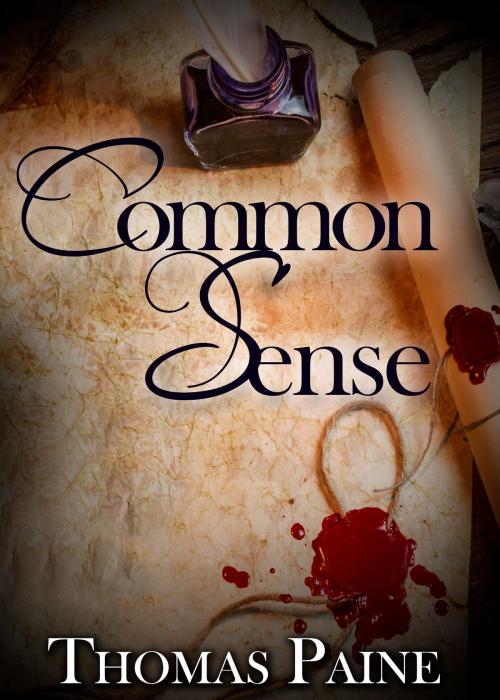Common Sense
[Free Audio Links]
Nonfiction, History, Revolutionary, Americas, United States, Revolutionary Period (1775-1800), Social & Cultural Studies, Political Science, Politics, History & Theory| Author: | Thomas Paine | ISBN: | 1230000153752 |
| Publisher: | Starbooks Classics Publishing | Publication: | July 21, 2013 |
| Imprint: | Language: | English |
| Author: | Thomas Paine |
| ISBN: | 1230000153752 |
| Publisher: | Starbooks Classics Publishing |
| Publication: | July 21, 2013 |
| Imprint: | |
| Language: | English |
Common Sense is a pamphlet written by Thomas Paine. It was first published anonymously on January 10, 1776, at the beginning of the American Revolution. Common Sense was signed "Written by an Englishman", and it became an immediate success. In relative proportion to the population of the colonies at that time, 2.5 million Americans, it had the largest sale and circulation of any book published in American history. Common Sense presented the American colonists with an argument for freedom from British rule at a time when the question of seeking independence was still undecided. Paine wrote and reasoned in a style that common people understood. Forgoing the philosophical and Latin references used by Enlightenment era writers, he structured Common Sense as if it were a sermon, and relied on Biblical references to make his case to the people. He connected independence with common dissenting Protestant beliefs as a means to present a distinctly American political identity. Historian Gordon S. Wood described Common Sense as "the most incendiary and popular pamphlet of the entire revolutionary era".
[Impact]
There were at least two reasons why Paine's brief pamphlet is believed to be "the most incendiary and popular pamphlet of the entire revolutionary era". First, while the average colonist was more educated than their European counterpart, European and colonial elites agreed that common people had no place in government or political debates. Common Sense targeted a popular audience and was written in a straightforward and simple way, so Paine's political ideas were made tangible and available to a common audience. This brought average colonists into political debate, which created a whole new political language. Illiterate colonists could hear Common Sense read at public gatherings; thusly, even the uneducated colonist was brought into this new political world. Paine's fresh style of political writing avoided use of complex Latin phrases and instead opted for a more direct, concise style that helped make the information accessible to all. Thus, Paine's "incendiary" words were heard even by those common folk who had never learned to read. The second reason involves the way the vast majority of colonists felt about the idea of independence from British rule. Before Common Sense was published, except for a few radical thinkers the people of the American colonies were "on the fence" about independence. Individuals were in conflict with themselves, and there were those who leaned toward reconciliation with the British crown. George Trevelyan in his History of the American Revolution had this to say about Paine's pamphlet:
It would be difficult to name any human composition which has had an effect at once so instant, so extended and so lasting [...] It was pirated, parodied and imitated, and translated into the language of every country where the new republic had well-wishers. It worked nothing short of miracles and turned Tories into Whigs.
There were those in high places who, while in agreement with Paine's sentiments, voiced criticism of his method. John Adams, who would succeed George Washington to become the new nation's second president, in his Thoughts on Government wrote that Paine's ideal sketched in Common Sense was "so democratical, without any restraint or even an attempt at any equilibrium or counter poise, that it must produce confusion and every evil work". In spite of Adams' formidable influence most people praised Paine's brief booklet. The editors of The Thomas Paine Reader, Michael Foot and Isaac Kramnick, in their introduction to Common Sense wrote:
Published anonymously, Common Sense appeared on Philadelphia streets in January 1776. It was an instant success, and copies of the pamphlet were soon available in all the thirteen colonies. Paine's was an unequivocal call for independence, and many Americans wavering between reconciliation with and independence from Britain were won over to separation by Paine's powerful polemic against monarchy, in general, and the British [monarchy], in particular.
The impact of Paine's thin little pamphlet upon the general call for independence, upon the other Founding Fathers and their construction of the Declaration of Independence, and upon the common folk, many of whom would soon join General Washington to fight the British army, was quickly spread and deeply felt. The moving words of Common Sense virtually knocked colonists down off the fence and into their fight for freedom.
Common Sense is a pamphlet written by Thomas Paine. It was first published anonymously on January 10, 1776, at the beginning of the American Revolution. Common Sense was signed "Written by an Englishman", and it became an immediate success. In relative proportion to the population of the colonies at that time, 2.5 million Americans, it had the largest sale and circulation of any book published in American history. Common Sense presented the American colonists with an argument for freedom from British rule at a time when the question of seeking independence was still undecided. Paine wrote and reasoned in a style that common people understood. Forgoing the philosophical and Latin references used by Enlightenment era writers, he structured Common Sense as if it were a sermon, and relied on Biblical references to make his case to the people. He connected independence with common dissenting Protestant beliefs as a means to present a distinctly American political identity. Historian Gordon S. Wood described Common Sense as "the most incendiary and popular pamphlet of the entire revolutionary era".
[Impact]
There were at least two reasons why Paine's brief pamphlet is believed to be "the most incendiary and popular pamphlet of the entire revolutionary era". First, while the average colonist was more educated than their European counterpart, European and colonial elites agreed that common people had no place in government or political debates. Common Sense targeted a popular audience and was written in a straightforward and simple way, so Paine's political ideas were made tangible and available to a common audience. This brought average colonists into political debate, which created a whole new political language. Illiterate colonists could hear Common Sense read at public gatherings; thusly, even the uneducated colonist was brought into this new political world. Paine's fresh style of political writing avoided use of complex Latin phrases and instead opted for a more direct, concise style that helped make the information accessible to all. Thus, Paine's "incendiary" words were heard even by those common folk who had never learned to read. The second reason involves the way the vast majority of colonists felt about the idea of independence from British rule. Before Common Sense was published, except for a few radical thinkers the people of the American colonies were "on the fence" about independence. Individuals were in conflict with themselves, and there were those who leaned toward reconciliation with the British crown. George Trevelyan in his History of the American Revolution had this to say about Paine's pamphlet:
It would be difficult to name any human composition which has had an effect at once so instant, so extended and so lasting [...] It was pirated, parodied and imitated, and translated into the language of every country where the new republic had well-wishers. It worked nothing short of miracles and turned Tories into Whigs.
There were those in high places who, while in agreement with Paine's sentiments, voiced criticism of his method. John Adams, who would succeed George Washington to become the new nation's second president, in his Thoughts on Government wrote that Paine's ideal sketched in Common Sense was "so democratical, without any restraint or even an attempt at any equilibrium or counter poise, that it must produce confusion and every evil work". In spite of Adams' formidable influence most people praised Paine's brief booklet. The editors of The Thomas Paine Reader, Michael Foot and Isaac Kramnick, in their introduction to Common Sense wrote:
Published anonymously, Common Sense appeared on Philadelphia streets in January 1776. It was an instant success, and copies of the pamphlet were soon available in all the thirteen colonies. Paine's was an unequivocal call for independence, and many Americans wavering between reconciliation with and independence from Britain were won over to separation by Paine's powerful polemic against monarchy, in general, and the British [monarchy], in particular.
The impact of Paine's thin little pamphlet upon the general call for independence, upon the other Founding Fathers and their construction of the Declaration of Independence, and upon the common folk, many of whom would soon join General Washington to fight the British army, was quickly spread and deeply felt. The moving words of Common Sense virtually knocked colonists down off the fence and into their fight for freedom.











![Cover of the book The Wizard of Oz [Books 1 - 17] [The Complete Collection] by Thomas Paine](https://www.kuoky.com/images/2013/april/300x300/1230000128494-5yNj_300x.jpg)



